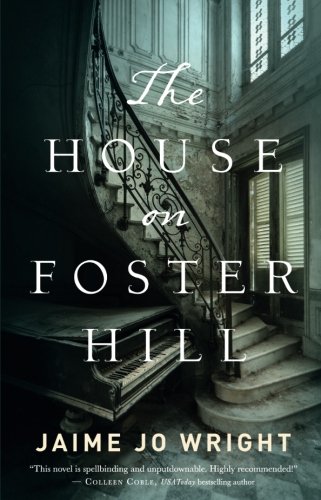REVIEW: "The House on Foster Hill" by Jaime Jo Wright
There are two things I hate – pretty much equally:
1. Creepy ass houses
2. Home renovations
So, if faced with the prospect of doing a home renovation in a creepy ass house, I would take no time to consider before answering firm-fucking-no.
One of the dual protagonists in this Jaime Jo Wright debut obviously doesn’t see eye-to-eye with me on this point – and, probably, on many points TBH.
This protagonist, Kaine Prescott, lost her husband two years ago in a car accident that police say was the result of him driving under the influence of drugs. Kaine, however, insists that this accident is caused by foul play.
Telling the police in the California town she calls home that her husband had never – would never – use drugs, Kaine implores them to dig deeper.
Meanwhile – as if things weren’t shitty enough – she starts to find signs that she is being stalked.
Gaining no headway with the police, and pretty scared of this stalker, Kaine decides to move to her familial hometown in Wisconsin, purchase an as-seen-on-the-internet fixer, and give it a go.
When she arrives, she finds that the fixer is really more of a tear-it-down-and-start-from-scratcher. But, having little money and even fewer options, she knows she must plow ahead with her initial plan, regardless of what it costs.
Fortunately for her, she forms bonds with some locals lightning-fucking-fast, so at least she won’t be going it alone.
But, it’s not all good news.
Right after forming these relationships, the same creepy stuff that induced her to flee from the sunny shores of Cali starts happening here.
As complex as this plot sounds, this is only one half of the novel.
Sandwiched between chapters featuring Kaine, we have chapters telling the story of Ivy, Kaine’s ancestor who called this Wisconsin town home over a century prior.
Ivy was the daughter of a small-town doctor and, as such, often attended to rudimentary autopsies – think “My Girl” but no Thomas Jay and no bees.
Ivy is pretty obsessed with death, not just because she is so often in close proximity to it, but also because she lost her twin brother, who died after an accident on an icy pond.
At the start of the book, Ivy accompanies her father to observe and collect the body of a girl who died under suspicious circumstances. This girl, as fate would have it, is found stuffed into the largely hollowed trunk of a tree that sits quite close to the house that – 100 years in the future – Kaine ends up purchasing.
Ivy becomes immediately obsessed with finding justice for the girl in the tree – who she calls Gabriella.
As her story progresses, she endeavors to find out who caused this girl’s death, and what happened to the baby that her father finds, through examination, must have been born shortly before Gabriella’s murder.
Her only help in the quest is detective Joel, who, in childhood, roamed the country-side with Ivy and her then living – obviously – brother.
So, was the book good?
Well, here’s the thing. This novel is, really, two books of vastly different quality.
One is a solid, lyrical, believable and emotion-provoking piece of historical fiction.
The other is a sloppy, schmaltzy, unrealistic work of contemporary fiction.
And that makes assessing the quality of the book as a whole incredibly difficult.
I absolutely adored the Ivy-centric chapters. The author modified her entire prose style, writing these chapters in a manner reminiscent of classic authors.
I cared about Ivy.
I wanted Ivy to succeed.
Kaine’s chapters, on the other hand, were forgettable, poorly written, fluff.
First, I found pretty much everything about the contemporary half of the novel largely unbelievable.
So, Kaine’s husband dies… then she gets stalked… then – despite the fact that she was never willing to buy a fixer with her husband, who wanted to purchase one – she decides to move all the way to Wisconsin and purchase one to fix up literally on her own… then, when she gets there, there are all of these people who want to help her… And, suddenly, the creepy stuff her stalker was doing started happening all over again.
None of it rang true.
Another factor that I need to consider when trying to decide upon an ultimate opinion of the book as a whole is the heavy - and I mean heavy - mention of Great Expectations.
This book, even 20 years since reading it, is still the one I cite when people ask me about my least favorite book. (which happens more frequently than you would expect when all of your acquaintances are book nerds)
I still remember reading Great Expectations - as a summer reading project heading in to freshman English. The only thing I enjoyed about the process was the post-reading party I had with my friends in which we dressed up as Mrs. Havisham and festooned an old, plastic, play wedding cake with fake cobwebs.
It was also convenient that, months after this party, the decidedly sexier cinematic version of this book, featuring Ethan Hawk and Gwyneth Paltrow, hit the theaters.
But, ultimately, even Hawks rather impressive ass couldn't save this Trainwreak of a book in my esteem.
Not only did the fact that I, personally, detest Great Expectations making its repeated mention like nails on a chalkboard to me, but also the constant reference to it made little sense. Theoretically, Gabriella, the girl who had been found dead, had written her diary in the margins (because she had no other paper) – Okay, that makes sense.
But then, another character had done the same – Okay.. Why… How many copies of “Great Expectations” are floating around? Is this the place where they put all of the copies of “Great Expectations” that high school students don’t want to read – because, in that case, I can imagine the stock-pile of the novels would be sizable indeed.
All factors considered, though, deciding on a final rating for this book is exceptionally hard.
Had the author written a novel consisting only of the Ivy material – even with the Great Expectations references – I would probably be giving this a solid four.
But Kaine’s material was so bad that, it diluted my enjoyment substantially.
It diluted it enough, in fact, that I have to give this novel 2 out of 5 cocktails.
Another day, another book. See what I’m reading next, here.
Somehow, even reading fanatics often find the material foisted upon them in school to be – well – pretty shitty. What novel were you forced to read in school that you absolutely hate? Tell me about it in the comments, below.
* Drink. Read. Repeat. is a participant in the Amazon Services LLC Associates Program, an affiliate advertising program designed to provide a means for sites to earn advertising fees by advertising and linking to Amazon.com. As an associate, we may earn commissions, at no cost to you, from qualifying purchases on Amazon.com








